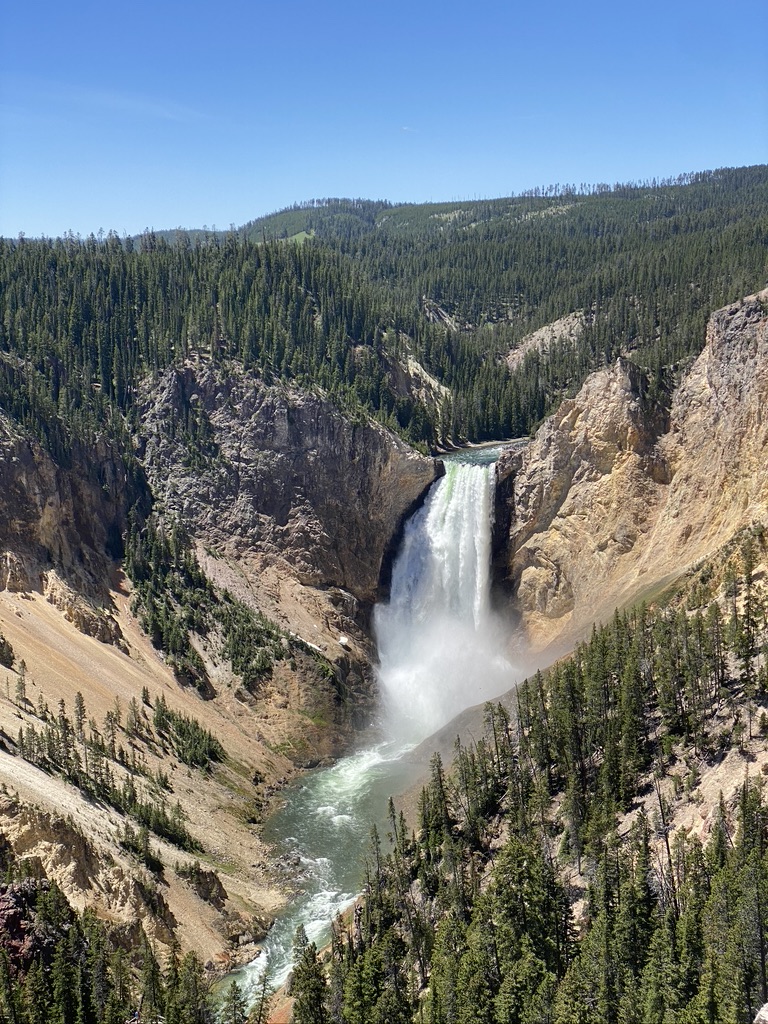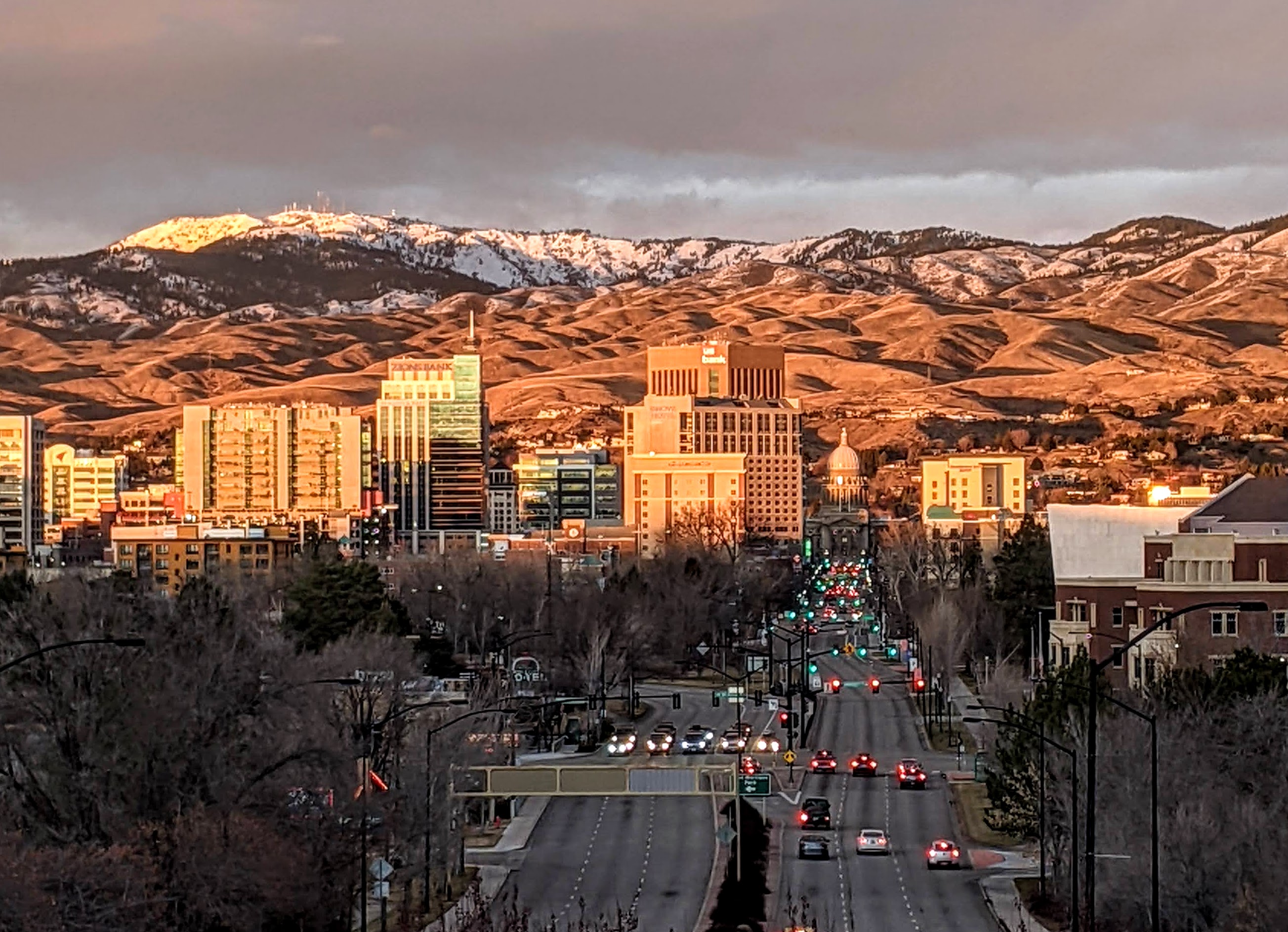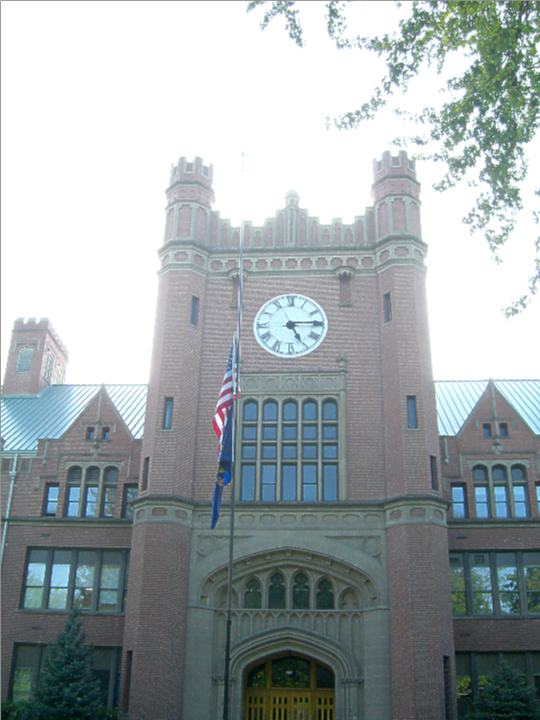|
William J. McConnell
William John McConnell (September 18, 1839March 30, 1925) was the third governor of Idaho from 1893 until 1897. He had previously represented the new state as one of its first United States Senators; Idaho achieved statehood in July 1890. Early years Born in Michigan and educated in its public schools, McConnell headed west as a freight wagon driver and ended up in California. There, he found work where he could get it: miner, store clerk, cowboy, and teacher. In 1862, he moved to Oregon, where he taught school, and then followed the gold rush into the Idaho Territory the following year. Perhaps based on his earlier experience in California, McConnell spotted opportunity on the way to the gold fields around Idaho City. Rather than joining the throngs of prospectors, he and two other men claimed some good farmland near Horseshoe Bend. He and the others dug the first significant irrigation ditch along the Payette River and began raising vegetables.James H. Hawley,'' History of Ida ... [...More Info...] [...Related Items...] OR: [Wikipedia] [Google] [Baidu] |
Idaho
Idaho ( ) is a state in the Pacific Northwest region of the Western United States. To the north, it shares a small portion of the Canada–United States border with the province of British Columbia. It borders the states of Montana and Wyoming to the east, Nevada and Utah to the south, and Washington and Oregon to the west. The state's capital and largest city is Boise. With an area of , Idaho is the 14th largest state by land area, but with a population of approximately 1.8 million, it ranks as the 13th least populous and the 7th least densely populated of the 50 U.S. states. For thousands of years, and prior to European colonization, Idaho has been inhabited by native peoples. In the early 19th century, Idaho was considered part of the Oregon Country, an area of dispute between the U.S. and the British Empire. It officially became U.S. territory with the signing of the Oregon Treaty of 1846, but a separate Idaho Territory was not organized until 1863, instead ... [...More Info...] [...Related Items...] OR: [Wikipedia] [Google] [Baidu] |
Placerville, Idaho
Placerville is a populated place in Boise County, Idaho, United States. The population was 53 at the 2010 census. It is part of the Boise City– Nampa, Idaho Metropolitan Statistical Area. History Placerville received its name because of placer mining in the vicinity. The ghost town is located 17 miles east of Horseshoe Bend. The townsite was selected December 1, 1862; and by December 16 there were six cabins in the camp. By the early summer of 1863, the town had 300 buildings and a population of 5,000. At the meeting of the first legislature held in Lewiston in 1863, the citizens obtained a charter for their city. Father Mesplie, a Catholic priest, held the first church service January 4, 1864, and in that same year a stage line was established between the Basin and Wallua to carry Wells Fargo express. It ran every other day from Placerville and went through in four days. By July 1864, 4500 claims had been recorded in the district. Unlike the earlier northern Idaho ... [...More Info...] [...Related Items...] OR: [Wikipedia] [Google] [Baidu] |
Willis Sweet
Willis Sweet (January 1, 1856 – July 9, 1925) was the first United States House of Representatives, United States Representative elected from Idaho following statehood in 1890. Sweet served as a History of the United States Republican Party, Republican in the House from 1890 to 1895, representing the state at-large. He vigorously demanded "Free Silver" or the unrestricted coinage of silver into legal tender, in order to pour money into the large silver mining industry in the Mountain West, but he was defeated by supporters of the gold standard. Early years Born in Alburgh (town), Vermont, Alburgh, Vermont on New Year's Day 1856, Sweet attended public schools and the University of Nebraska–Lincoln, University of Nebraska in Lincoln, Nebraska, Lincoln, and was a member of the Phi Delta Theta Fraternities and sororities in North America, fraternity. He learned the printer's trade in Lincoln and relocated west to Moscow, Idaho, Moscow in the Idaho Territory in 1881. Sweet was the ... [...More Info...] [...Related Items...] OR: [Wikipedia] [Google] [Baidu] |
William Borah
William Edgar Borah (June 29, 1865 – January 19, 1940) was an outspoken History of the United States Republican Party, Republican United States Senator, one of the best-known figures in History of Idaho, Idaho's history. A Progressivism in the United States, progressive who served from 1907 until his death in 1940, Borah is often considered an isolationist, because he led the Irreconcilables, senators who would not accept the Treaty of Versailles, Senate ratification#United States, ratification of which would have made the U.S. part of the League of Nations. Borah was born in rural Illinois to a large farming family. He studied at the University of Kansas and became a lawyer in that state before seeking greater opportunities in Idaho. He quickly rose in the law and in state politics, and after a failed run for the House of Representatives in 1896 and one for the United States Senate in 1903, was elected to the Senate in 1907. Before he took his seat in December of that y ... [...More Info...] [...Related Items...] OR: [Wikipedia] [Google] [Baidu] |
Boise, Idaho
Boise (, , ) is the capital and most populous city of the U.S. state of Idaho and is the county seat of Ada County. On the Boise River in southwestern Idaho, it is east of the Oregon border and north of the Nevada border. The downtown area's elevation is above sea level. The population according to the 2020 US Census was 235,684. The Boise metropolitan area, also known as the Treasure Valley, includes five counties with a combined population of 749,202, the most populous metropolitan area in Idaho. It contains the state's three largest cities: Boise, Nampa, and Meridian. Boise is the 77th most populous metropolitan statistical area in the United States. Downtown Boise is the cultural center and home to many small businesses and a number of high-rise buildings. The area has a variety of shops and restaurants. Centrally, 8th Street contains a pedestrian zone with sidewalk cafes and restaurants. The neighborhood has many local restaurants, bars, and boutiques. The are ... [...More Info...] [...Related Items...] OR: [Wikipedia] [Google] [Baidu] |
Prohibition Party
The Prohibition Party (PRO) is a political party in the United States known for its historic opposition to the sale or consumption of alcoholic beverages and as an integral part of the temperance movement. It is the oldest existing third party in the United States and the third-longest active party. Although it was never one of the leading parties in the United States, it was once an important force in the Third Party System during the late 19th and early 20th centuries. The organization declined following the enactment of Prohibition in the United States but saw a rise in vote totals following the repeal of the Eighteenth Amendment in 1933. However, following World War II it declined with 1948 being the last time its presidential candidate received over 100,000 votes and 1976 being the last time it received over 10,000 votes. The party's platform has changed over its existence. Its platforms throughout the 19th century supported progressive and populist positions including ... [...More Info...] [...Related Items...] OR: [Wikipedia] [Google] [Baidu] |
People's Party (United States)
The People's Party, also known as the Populist Party or simply the Populists, was a left-wing Agrarianism, agrarian populist political party in the United States in the late 19th century. The Populist Party emerged in the early 1890s as an important force in the Southern and Western United States, but collapsed after it nominated Democratic Party (United States), Democrat William Jennings Bryan in the 1896 United States presidential election. A Rump party, rump faction of the party continued to operate into the first decade of the 20th century, but never matched the popularity of the party in the early 1890s. The Populist Party's roots lay in the Farmers' Alliance, an agrarian movement that promoted economic action during the Gilded Age, as well as the Greenback Party, an earlier third party that had advocated fiat money. The success of Farmers' Alliance candidates in the 1890 United States elections, 1890 elections, along with the conservatism of both major parties, encouraged Fa ... [...More Info...] [...Related Items...] OR: [Wikipedia] [Google] [Baidu] |
Democratic Party (United States)
The Democratic Party is one of the two major contemporary political parties in the United States. Founded in 1828, it was predominantly built by Martin Van Buren, who assembled a wide cadre of politicians in every state behind war hero Andrew Jackson, making it the world's oldest active political party.M. Philip Lucas, "Martin Van Buren as Party Leader and at Andrew Jackson's Right Hand." in ''A Companion to the Antebellum Presidents 1837–1861'' (2014): 107–129."The Democratic Party, founded in 1828, is the world's oldest political party" states Its main political rival has been the Republican Party since the 1850s. The party is a big tent, and though it is often described as liberal, it is less ideologically uniform than the Republican Party (with major individuals within it frequently holding widely different political views) due to the broader list of unique voting blocs that compose it. The historical predecessor of the Democratic Party is considered to be th ... [...More Info...] [...Related Items...] OR: [Wikipedia] [Google] [Baidu] |
William H
William is a male given name of Germanic origin.Hanks, Hardcastle and Hodges, ''Oxford Dictionary of First Names'', Oxford University Press, 2nd edition, , p. 276. It became very popular in the English language after the Norman conquest of England in 1066,All Things William"Meaning & Origin of the Name"/ref> and remained so throughout the Middle Ages and into the modern era. It is sometimes abbreviated "Wm." Shortened familiar versions in English include Will, Wills, Willy, Willie, Bill, and Billy. A common Irish form is Liam. Scottish diminutives include Wull, Willie or Wullie (as in Oor Wullie or the play ''Douglas''). Female forms are Willa, Willemina, Wilma and Wilhelmina. Etymology William is related to the given name ''Wilhelm'' (cf. Proto-Germanic ᚹᛁᛚᛃᚨᚺᛖᛚᛗᚨᛉ, ''*Wiljahelmaz'' > German ''Wilhelm'' and Old Norse ᚢᛁᛚᛋᛅᚼᛅᛚᛘᛅᛋ, ''Vilhjálmr''). By regular sound changes, the native, inherited English form of the name shoul ... [...More Info...] [...Related Items...] OR: [Wikipedia] [Google] [Baidu] |
Latah County, Idaho
Latah County ( ) is a county located in the north central region of the U.S. state of Idaho. As of the 2020 census, the population was 39,517. The county seat and largest city is Moscow, the home of the University of Idaho, the state's flagship until 2012 and land-grant university. The county was created in 1888 and named for Latah Creek in its northwest corner. The name was derived from two words in the Nez Perce language to evoke the sense of "the place of pine trees and sestle." The tribe found shade under the white pine trees for doing their work and stones suitable for use in pulverizing camas roots to process as one of their food staples. Latah County comprises the Moscow, ID Micropolitan Statistical Area, which is included in the Pullman-Moscow, WA-ID Combined Statistical Area. The county comprises the majority of the eastern portion of the Palouse, famous for its rolling hills and rich agriculture. Latah County is the only county in the U.S. established by an act ... [...More Info...] [...Related Items...] OR: [Wikipedia] [Google] [Baidu] |
Oregon State Senate
The Oregon State Senate is the upper house of the statewide legislature for the US state of Oregon. Along with the lower chamber Oregon House of Representatives it makes up the Oregon Legislative Assembly. There are 30 members of the state Senate, representing 30 districts across the state, each with a population of 127,700. The state Senate meets in the east wing of the Oregon State Capitol in Salem. Oregon state senators serve four-year terms without term limits. In 2002, the Oregon Supreme Court struck down the decade-old Oregon Ballot Measure 3, that had restricted state senators to two terms (eight years) on procedural grounds. Like certain other upper houses of state and territorial legislatures and the United States Senate, the state Senate can confirm or reject gubernatorial appointments to state departments, commissions, boards, and other state governmental agencies. The current Senate president is Peter Courtney of Salem. Oregon, along with Arizona, Maine, New Ha ... [...More Info...] [...Related Items...] OR: [Wikipedia] [Google] [Baidu] |






